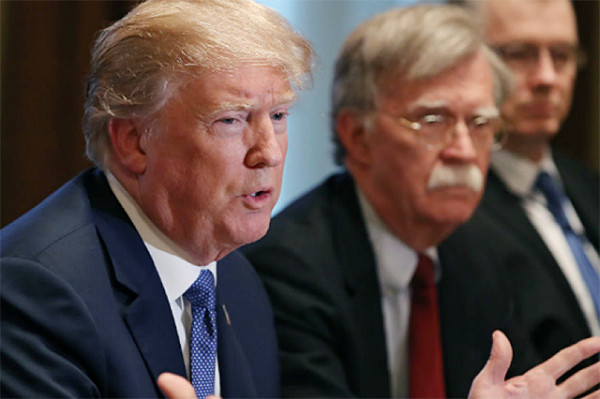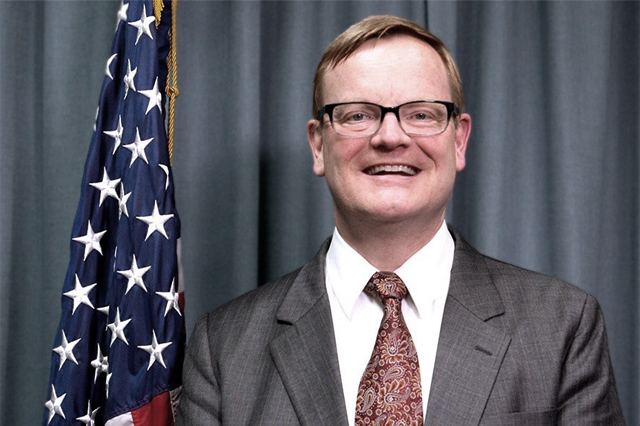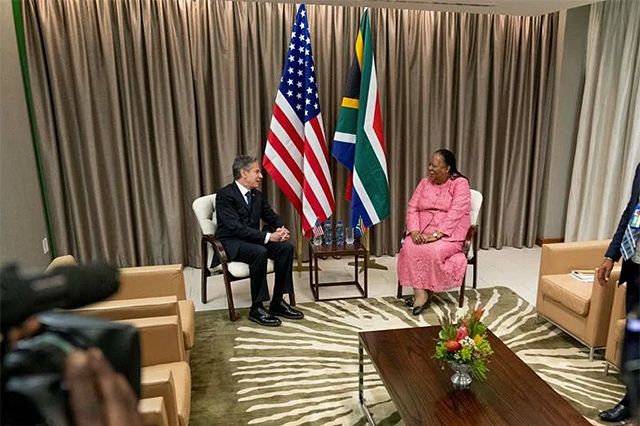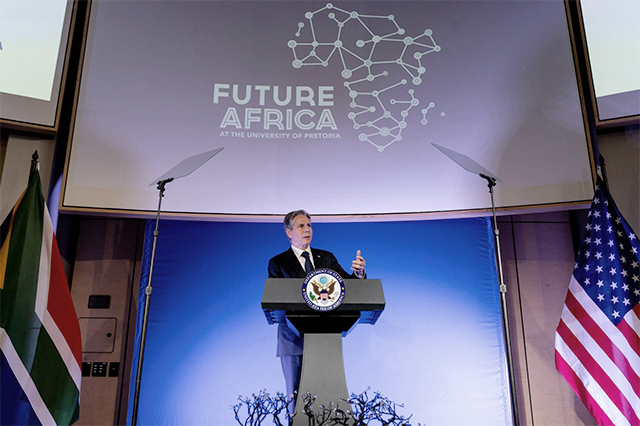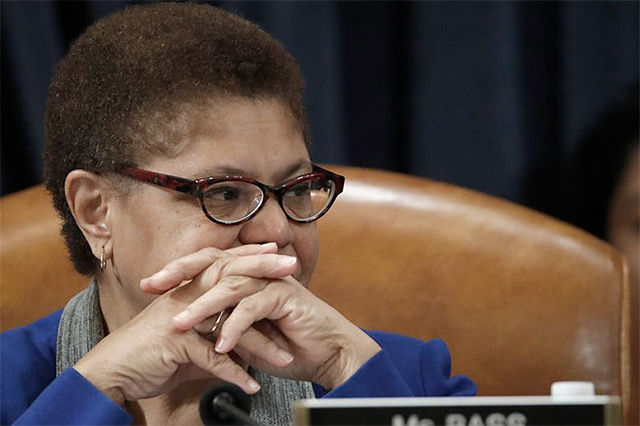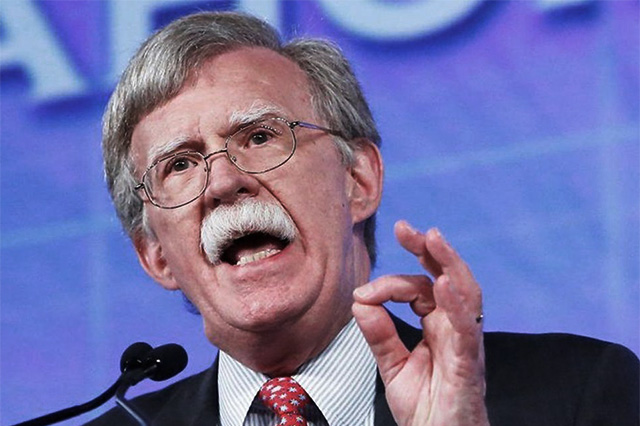'Bolton rolls out Trump’s Africa policy to grim reception, but I’m reserving judgment'
If you care about Africa or work on the continent, the equivalent of Willy Wonka’s Golden Ticket last week was an invitation from the Heritage Foundation for the unveiling of the Trump Administration’s New Africa Strategy by U.S. National Security Advisor John Bolton.
The plan, in the works for one year, was a closely guarded secret. Congressional staff invited to the roll-out only received the White House fact sheet upon arrival at Heritage, and while the policy was “an intensive interagency process,” few outside of the National Security Council knew in advance how things would roll on 13 December.
The Douglas and Sarah Allison Auditorium was filled to its 150-person capacity with a mix of journalists, African dignitaries, U.S. government officials, policy wonks and other interested parties like me.
But John Bolton’s speech did not seem directed to us, but rather to President Donald Trump and his political base.
“This strategy reflects the core tenets of President Trump’s foreign policy doctrine and remains true to his central campaign promise to put the interests of the American People first,” Bolton said. “Under our new approach, every decision we make, every policy we pursue, and every dollar of aid we spend will further U.S. priorities in the region.”
Bolton warned: “The United States will no longer provide indiscriminate assistance across the entire continent, without focus or prioritization… From now on, the United States will not tolerate this longstanding pattern of aid without effect, assistance without accountability, and relief without reform.”
In contrast to other policy roll-outs where administration officials tend to speak in aspirational terms, Bolton was dark and foreboding.
“Great power competitors, namely China and Russia, are rapidly expanding their financial and political influence across Africa. They are deliberately and aggressively targeting their investments in the region to gain a competitive advantage over the United States.”
Bolton referred to the predatory practices of China through its stated-directed Belt and Road Initiative (BRI) which aims to strengthen infrastructure, trade, and investment links between China and some 65 other countries that account collectively for over 30 percent of global GDP, 62 percent of population, and 75 percent of known energy reserves.
While the U.S. is Africa’s largest investor according to EY Global 2018 Africa Attractiveness report, China is its largest creditor.
Bolton blamed the BRI for saddling countries with unsustainable debt and cited the example of Zambia’s debt to China of between $6 to $10 billion dollars, with the country forced to turn over its national utility to meet its debt-serving obligations.
In consideration of U.S. interests, Bolton laid out three goals for the Trump Administration’s new Africa policy:
- Advancing U.S. trade and commercial ties with nations across the region to the benefit of both the United States and Africa;
- Countering the threat from Radical Islamic Terrorism and violent conflict.
- Ensuring that U.S. taxpayer dollars for aid are used efficiently and effectively.
For the most part the audience sat stone-faced, few discernable smiles, intermittent shaking of heads, the invitees seemingly trying to decipher the forward implications of Bolton’s words.
Later that day, in testimony before the House Foreign Affairs Committee, Assistant Secretary of State for African Affairs Tibor Nagy sought to refine the narrative from the stark choices laid out by Bolton.
“Challenges with infrastructure, corruption and terrorism continue, and China is asserting itself on the continent economically, militarily, and politically,” he said. “We must remain a positive alternative and make clear that engaging with the United States will mean greater prosperity and security for Africa.”
Bolton’s statement seemed to suggest the U.S. was more interested in countering China and Russia than advancing U.S. policy objectives; it was a narrative that spoke to what the U.S. would not do versus what it was committed to, and contained random shout-outs to Africa’s bad performers. Lost in that deliberately provocative style were some positive indicators, one of which was reference to “Prosper Africa,” a new initiative to support U.S. investment across the continent.
While no details were given, and it is unclear what funds will back-up “Proper Africa,” the announcement follows on President Trump signing into law the BUILD ACT which provides new authorities to the Overseas Private Investment Corporation (OPIC), including doubling its lending cap to $60 billion dollars and rebranding it the U.S. International Development Finance Agency (USIDFC).
Further hints of “Prosper Africa” can be found in the U.S. Department of Commerce’s embrace of the President’s Advisory Council for Doing Business in Africa (PAC-DBIA) where Secretary Wilbur Ross participated in a mission this past July to Ethiopia, Kenya, Ghana and Côte d’Ivoire. The four countries were selected because of their market attractiveness for U.S. trade and investment.
The outcome of the mission included the accrual of $1 billion dollars in new investments, the signing of memorandums of understanding to promote public-private partnerships, and a comprehensive list of recommendations submitted to President Trump by the PAC-DBIA members.
In the murmur of the audience as the speech broke up, and the tweets rolling out thereafter, concerns were expressed about what was not in the remarks, most especially a lack of emphasis on democracy, rule of law, and human rights.
The omission worried me too, but only in the immediate short-term. And if the objective of the Trump policy is to increase deal flow, fact patterns will prevail. It is a fact that Foreign Direct Investment is drawn to, and succeeds in, environments where democratic institutions, transparency and rule of law exists. As such, you can’t push trade without advocating for the enabling environment for FDI, all of which gets you to democracy and governance.
Notably, one of the top 3 recommendations of the PAC-DBIA was to continue U.S. government programming and advocacy focus on transparency and rule-of-law in support.
Queueing for a taxi after the event, a representative from a local think tank remarked to those of us in line, “maybe the best part about today is that Trump felt compelled to define an Africa policy?”
I am saving my judgement for release of the Fiscal Year Budget in 2019, at which point we will know what the Trump Africa Strategy really means.
Will the administration double down on the Millennium Challenge Corporation, like it did with OPIC, distinguishing its catalytic role to make the investment environment more attractive to private investors? Will it support the USAID Trade and Investment Hubs and Power Africa, recognize that the Africa Growth and Opportunity Act (AGOA) remains foundational to trade policy, and that harmonization and coordination of inter-African trade through African Continental Free Trade Area (AfCFTA) benefits U.S. investors?
And will the Trump administration’s new OMB director give up on the agency’s demand of a 30 percent rescission of the foreign aid budget, as tabled, and then walked back by Congress during the past two fiscal years?
Some analysts have suggested that Bolton’s remarks set up China and the U.S. for a zero-sum game, implying that the U.S. plans to re-fight a cold war in Africa against the Russians and the Chinese. But that interpretation assumes a power dynamic that no longer exists. There are no supplicants here.
Ghana’s President Nana Akufo-Addo said on the margins of the FT Africa Summit in October: “We need to focus on what we (as Africans) can do for ourselves.” He noted that we go into these deals with “eyes open.”
Riva Levinson is president and CEO of KRL International LLC, a D.C.-based consultancy that works in the world’s emerging markets.


